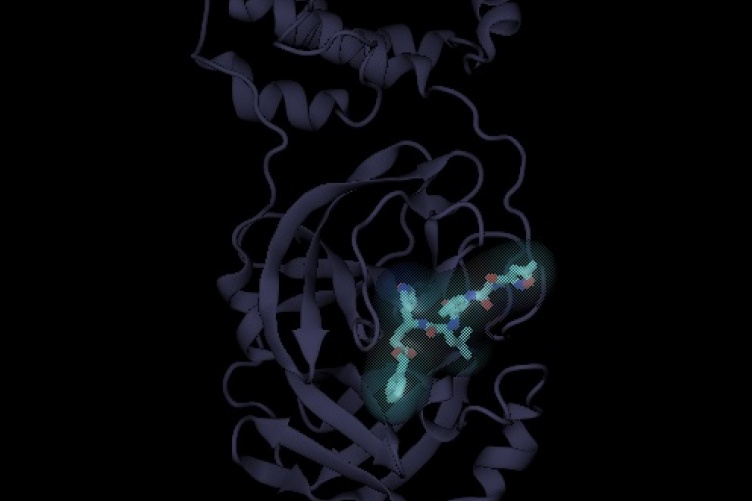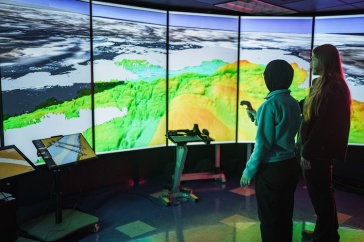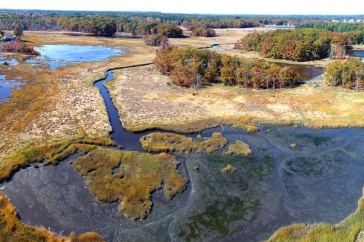
Harish Vashisth and Krisztina Varga will investigate how to block the activity of this protease enzyme from coronavirus.
UNH has launched six interdisciplinary research projects that address public health and welfare challenges related to COVID-19. The pilot projects, supported by the Office of Research, Economic Engagement and Outreach and Office of the Provost as part of the Collaborative Research Excellence (CoRE) initiative, harness expertise from across the university in fields as diverse as microbiology, digital literacy, environmental engineering and public health.
“The COVID-19 pandemic presents challenges that can only be solved through multidisciplinary collaborations.”
“UNH is committed to public-impact research that solves the most pressing problems facing New Hampshire and the world. The COVID-19 pandemic presents challenges that can only be solved through multidisciplinary collaborations,” says Marian McCord, senior vice provost for research, economic engagement and outreach. “The proposals were outstanding, and our research development team is committed to assisting each team in seeking external funding to support the proposed work.”
The projects and collaborating researchers are as follows:
Approaches to Inhibit an Enzyme Causing COVID-19
Harish Vashisth, associate professor, chemical engineering; Krisztina Varga, associate professor, molecular, cellular & biomedical sciences; Doug Frantz, University of Texas, San Antonio
By developing approaches to block the activity of the main protease enzyme from coronavirus, this research could contribute significantly to the development of a type of drug to address COVID-19. To do this, the researchers will apply an interdisciplinary computational and experimental investigation to probe the conformational dynamics of the key protease enzyme with and without inhibitory small molecules.
Development and Deployment of a Rapid Surveillance Tool for SARS-CoV-2 in Environmental Samples
Paula Mouser, associate professor of civil and environmental engineering; Steve Jones, research associate professor of natural resources and the environment; Fabrizio Colosimo, postdoctoral researcher, civil and environmental engineering
This project aims to develop tools for environmental surveillance of COVID to greatly expand the ability to track the spread of the disease and its routes of transmission beyond testing suspected infections. The researchers will develop a diagnostic methodology capable of quantifying SARS-CoV-2 in environmental samples such as water, air, solids and surfaces. The researchers say applications could include assessing the efficacy of wastewater treatment processes on viral removal; assessing human exposure via seafood ingestion or direct contact in recreational waters; or validating methods for disinfection such as during ultraviolet treatment of personal protective equipment.
Dynamics of Risk and Resilience in Response to the COVID-19 Pandemic
Semra Aytur, associate professor, health management and policy; Jessica Carson, research assistant professor, Carsey School; supporting team from CHHS, Carsey School, Cooperative Extension, EOS, Institute for Health Policy and Practice, Institute on Disability, Paul College
This project will convene UNH researchers and partners to identify populations at greatest risk for COVID-19 and its stress-related impacts, and to develop data-driven, place-based capacities that enable communities to adapt to a changing world. Social distancing and limiting public activity are the most effective actions that can be taken to prevent viral transmission, but these actions can place further strain on vulnerable individuals and families. The researchers will utilize a complex socio-ecological systems (SES) approach that frames vulnerability in terms of three key drivers: exposure, sensitivity or susceptibility and adaptive capacity, which includes individual, community and system-level responses to a crisis that can increase resilience over time. The results of this project will inform data-driven insights to help protect public health, including the most vulnerable members of our communities.
Improved Application of UV Disinfection for Viral Pandemic Response
Jim Malley, professor of civil and environmental engineering; Joel Ducoste, North Carolina State University College of Engineering
For the past two months, Malley and his UNH team have provided pro bono assistance in using ultraviolet light to disinfect personal protective equipment for professionals on the frontlines of the public health battle against COVID-19. This project aims to fill research gaps Malley identified, including developing a better understanding of temperature, relatively humidity, aerosol droplet size and chemistry as well as how critical properties of contaminated surfaces affect UV effectiveness.
Investigating the Efficacy of Mutated Neutralizing SARS-CoV Antibodies Against SARS-CoV-2
Sherine Elsawa, associate professor, molecular, cellular & biomedical sciences; Jeff Halpern assistant professor, chemical engineering; Robert Pantazes, Auburn University; Eva Rose Balog, University of New England
This research will explore the ability of engineering three antibodies that neutralize SARS-CoV (the virus that causes SARS) to bind to SARS-CoV2, the virus that causes COVID-19. The researchers propose to validate existing computational data using biological experiments in the laboratory; ultimately, this work could be a viable path to developing therapeutics for treating COVID-19.
TILDE: Transformational Inquiry in Literacy and Digital Environments During COVID-19
Bethany Silva, research assistant professor of education; Alecia Magnifico, associate professor of English; Christina Ortmeier-Hooper, associate professor of English; Laura Allen, assistant professor of psychology
Even before COVID-19, New Hampshire had written state standards addressing the importance of teaching digital literacies. The onset of the pandemic, however, forced school districts to quickly implement remote learning. This rapid shift to digital tools and teaching methods has revealed significant inequities in access to, resources for, and knowledge of digital literacies in our state — factors that will limit educational opportunity for many students. In response, the TILDE project will look across K16 education to investigate how K12 and college educators transitioned to remote learning to develop recommendations for state policy and teachers’ professional learning to enact more equitable implementation.
Each project will receive a one-year grant of $30,000. Eight reviewers representing each college and the Institute for the Study of Earth, Oceans, and Space reviewed 23 proposals in less than a week. Reviewers were Rick Cote, professor of molecular, cellular & biomedical sciences; David Divins, associate director of EOS; Stanley Kowalski, senior lecturer at UNH Franklin Pierce School of Law; John LaCourse, professor of electrical and computer engineering; Dain LaRoche, professor of kinesiology; Victoria Parker, associate dean of Paul College; Mihaela Sabin, professor of applied engineering and sciences at UNH Manchester; and Stephen Trzaskoma, professor of classics, humanities and Italian studies.
-
Written By:
Beth Potier | UNH Marketing | beth.potier@unh.edu | 2-1566
















































